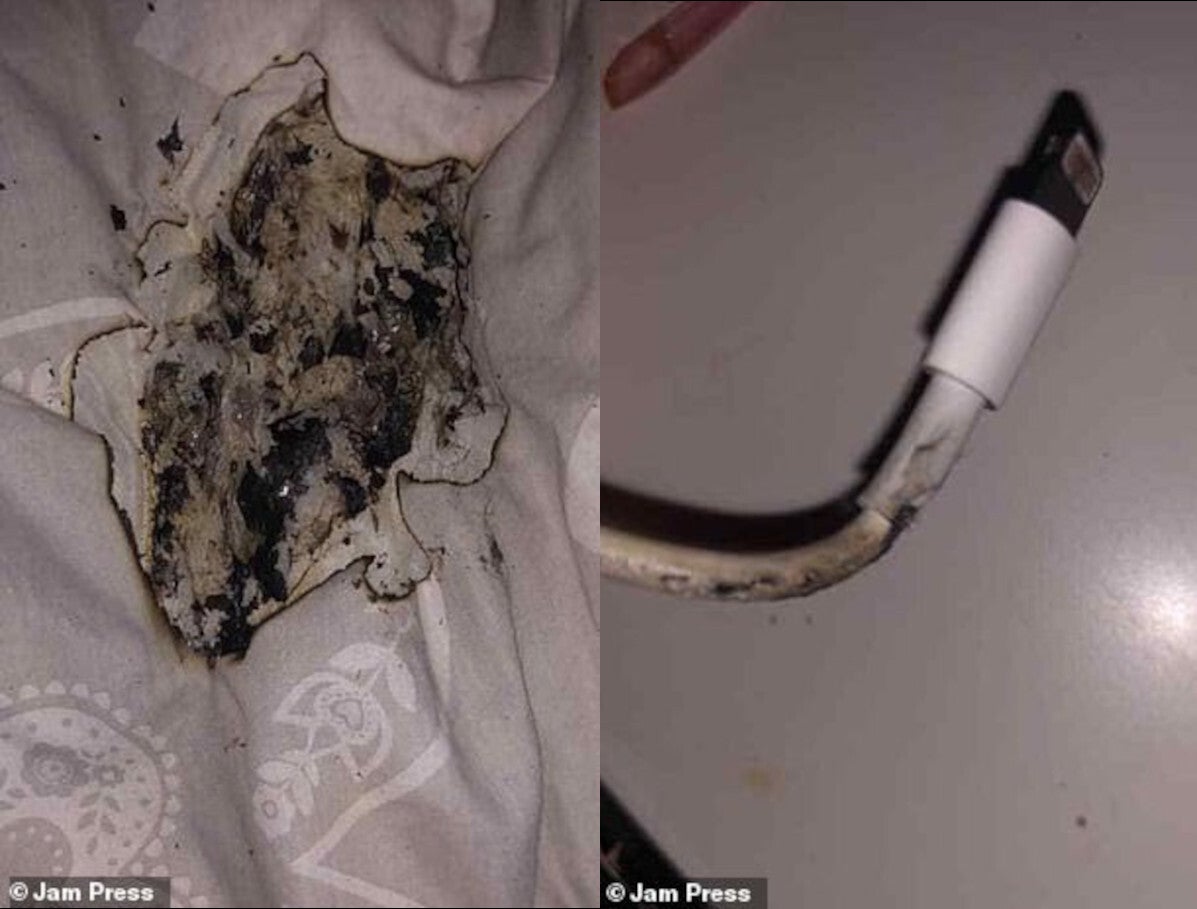iPhone charger catches fire, leaving girl's face burned

Last Thursday, Amie Hall, a formal dental nurse, was getting ready for bed in Birmingham, England. She changed her clothes, climbed under the covers, and just before she dozed off, Amie plugged in her phone to charge overnight, laying it on the bed next to her. It's a routine most of us go through every night, but in Amie's case, she was still nodding off when she became aware of an orange blaze glowing next to her, smoke, and felt a searing pain in her cheek. The duvet had caught fire where her phone lay charging. Amie leapt off the bed, and with the help of her mother, the flames were put out before things took a turn for the worse.
I had just been lying down and I was falling asleep when I became aware of flashing orange colours next to me.
We've always been told never to leave our phones charging under the pillow, because if there is a battery malfunction, there is no room for heat to escape, and our face is only centimeters away. We still stand by that, as there have been multiple previous cases (some of them much worse) involving similar accidents. In 2018, CEO Nazrin Hassan died when one of his phones exploded at his bedside, setting his house on fire.
- iPhone 13: Release date, price, specs and leaks
Such incidents aren't confined to any one particular phone brand, although years ago, the Galaxy Note 7 and Galaxy S7 Edge were known culprits in a string of similar disasters, with an internal battery issue discovered at fault. In Hassan's case, the phone that caused the accident was either a BlackBerry or a Huawei, as he used both.

Amie's charger and mattress after the damage was done
How to keep yourself (and your iPhone) safe at night
Amie is grateful she was still half-awake when the fire started. There was no apparent "explosion" that signified the start of the fire, as it usually happens when a phone battery is at fault. In Amie's case, it was the cable that melted, and the fire began to burn silently. After the incident, many people (Amie included) are calling for this to be a lesson in never leaving your phone to charge overnight.
Apple doesn't agree, advising that their lithium-ion batteries are completely safe to stay plugged in all night and cannot be overcharged, as iPhones stop charging when they reach 100%. (Trickle charging is a different debate, as many experts still say it's detrimental to battery life.) Rather, there are other potential pitfalls to be aware of when trying to charge your phone safely at night.
Amie admits that while she was using the cable that came with her iPhone, it was connected to the wall via a third-party adapter. Apple is investigating the issue, and it is not yet known whether it was the cable or non-OEM adapter that caused the fire, or the wall socket itself. Either way, it is always safest to use either your iPhone's original charger (and adapter) or an MFi-certified alternative.
Whether you have an iPhone or another smartphone, there are a number of precautions you can take, just to be safe. For one, if you notice the charging cable is becoming badly frayed or emitting a buzzing hissing sound at times, it would be best to replace it immediately.
Furthermore, if you ever have to replace an iPhone battery, it's important that you do so at an official Apple store. Many independent phone repair businesses use cheaper, non-original replacement batteries, and this can often hurt your phone and constitute a real safety hazard.
Among other battery-preserving tips on its site, Apple advises removing thicker cases from iPhones while charging them (especially if you are using a MagSafe or other Qi charger). If there is excessive heat being generated for any reason, there is less risk of it staying trapped inside and increasing or hurting your battery.
Some are also suggesting it would be a good idea to place your phone on some sort of a metal platform or inflammable surface a good distance away from your head, if you are going to charge it overnight. That way, if something ever does happen, it can hopefully be contained without risk of burns or getting hit by shrapnel.
When all is said and done, as long as you are following the basic safety rules (i.e. use chargers certified with your phone brand, and don't sleep with the phone on your bed), the risk for anything horrible happening to your phone is extremely minimal. Cases like Amie's are very few and far between and shouldn't be any cause for concern when properly handling your own device.
Read more:









Things that are NOT allowed: